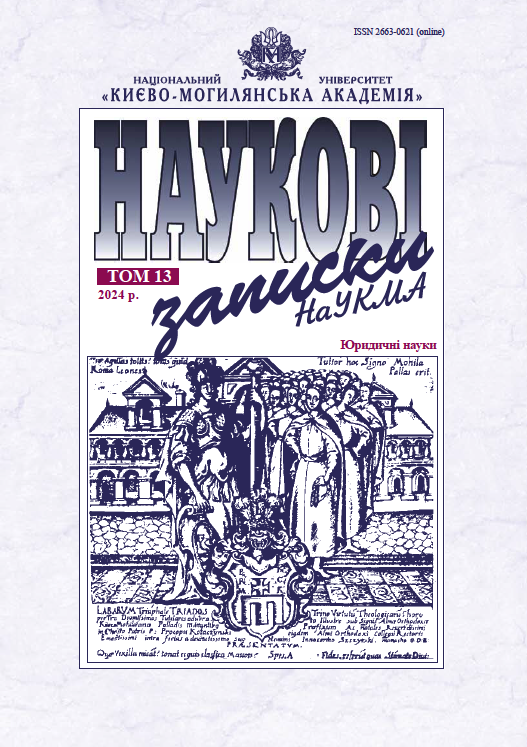Правове регулювання систем штучного інтелекту в ЄС: передумови, сучасний стан та перспективи
DOI:
https://doi.org/10.18523/2617-2607.2024.13.65-73Ключові слова:
правове регулювання, системи штучного інтелекту, штучний інтелект, ШІ, ЄС, Європейський СоюзАнотація
Україна неодноразово підтверджувала наміри запровадити правове регулювання систем штучного інтелекту, що, зокрема, втілилося в Концепції розвитку штучного інтелекту, схваленій у 2020 р. Потреба в регулюванні зумовлена багатьма чинниками, зокрема активним впровадженням систем штучного інтелекту в Україні та необхідністю встановлення правил розроблення та використання таких систем. Водночас дедалі частіше стверджується, що для встановлення правового регулювання Україна має врахувати підхід, який уже виробив Європейський Союз. З огляду на євроатлантичний вектор розвитку України важливо простежити генезу виникнення регулювання штучного інтелекту в ЄС, його сучасний стан та перспективи. У статті досліджено передумови виникнення правового регулювання, наведено приклади появи перших етичних стандартів регулювання штучного інтелекту та продемонстровано, як ці стандарти було втілено в нещодавно прийнятому Акті про штучний інтелект. Також розглянуто перспективи правового регулювання систем штучного інтелекту.
Посилання
- Baranov, Oleksandr. Internet rechei: teoretyko-metodolohichni osnovy pravovoho rehuliuvannia. T. 1: Sfery zastosuvannia, ryzyky i bariery, problemy pravovoho rehuliuvannia. Kyiv: ArtEk, 2018 [in Ukrainian].
- Buiten, Miriam C. “Towards Intelligent Regulation of Artificial Intelligence.” European Journal of Risk Regulation 10 no. 1 (2019): 41–59. https://doi.org/10.1017/err.2019.8.
- Bunge, Mario. “Towards a Technoethics.” Philosophic Exchange 6, no. 1, art. 3 (1975): 69–79. https://core.ac.uk/download/pdf/233574123.pdf.
- Burri, Thomas, and Fredrik von Bothmer. “The New EU Legislation on Artificial Intelligence: A Primer.” (April 21, 2021). http://dx.doi.org/10.2139/ssrn.3831424.
- Burri, Thomas. “The New Regulation of the European Union on Artificial Intelligence: Fuzzy Ethics Diffuse into Domestic Law and Sideline International Law.” In The Cambridge Handbook of Responsible Artificial Intelligence: Interdisciplinary perspectives, edited by Silja Voeneky, Philipp Kellmeyer, Oliver Mueller, and Wolfram Burgard. Cambridge: Cambridge University Press, 2022. http://dx.doi.org/10.2139/ssrn.3865149.
- Cellan-Jones, Rory. “Stephen Hawking Warns Artificial Intelligence Could End Mankind.” BBC, December 2, 2014. https://www.bbc.com/news/technology-30290540.
- European Commission. White Paper On Artificial Intelligence – A European approach to excellence and trust COM(2020) 65 final. February 19, 2020. https://eur-lex.europa.eu/legalcontent/EN/TXT/PDF/?uri=CELEX:52020DC0065.
- European Parliament. Legislative train 08.2024. A Europe Fit for the Digital Age. Artificial Intelligence Act. August 20, 2024. https://www.europarl.europa.eu/legislative-train/carriage/regulationon-artificial-intelligence/report?sid=8301.
- High-Level Expert Group on Artificial Intelligence. Ethics Guidelines for Trustworthy AI. April 8, 2019. https://op.europa.eu/en/publication-detail/-/publication/d3988569-0434-11ea-8c1f-01aa75ed71a1.
- Hoffmann-Riem, Wolfgang. “Artificial Intelligence as a Challenge for Law and Regulation.” In Regulating Artificial Intelligence, edited by Thomas Wischmeyer and Timo Rademacher. Springer, 2020. https://doi.org/10.1007/978-3-030-32361-5_1.
- Horodyskyi, I. M. “Tendentsii rozvytku pravovoho rehuliuvannia shtuchnoho intelektu v Yevropeiskomu Soiuzi.” In IT-Pravo: Problemy ta perspektyvy rozvytku v Ukraini, 51–7. Lviv: Lviv Polytechnic National University, 2017 [in Ukrainian].
- Jobin, Anna, Marcello Ienca, and Effy Vayena. “The global landscape of AI ethics guidelines.” Nature Machine Intelligence 1 (2019): 389–99. https://doi.org/10.1038/s42256-019-0088-2.
- Kornieieva, S. “Theoretical approaches to the definition and legal regulation of artificial intelligence.” Uzhhorod National University Herald. Series: Law 66 (2021): 50–55. https://doi.org/10.24144/2307-3322.2021.66.9 [in Ukrainian].
- Mazzini, Gabriele, and Salvatore Scalzo. “The Proposal for the Artificial Intelligence Act: Considerations around Some Key Concepts.” In Camardi (a cura di), La via europea per l’Intelligenza artificiale. 2023 (May 2, 2022). http://dx.doi.org/10.2139/ssrn.4098809.
- Myltseva, Veronika. “Elektronne pravosuddja: vynyknennja ta perspektyvy rozvytku” [“Electronic justice: origins and development prospects”]. PhD Thesis, Taras Shevchenko Kyiv National University, 2020 [in Ukrainian].
- Petit, Nicolas. “Law and Regulation of Artificial Intelligence and Robots – Conceptual Framework and Normative Implications.” (March 9, 2017). http://dx.doi.org/10.2139/ssrn.2931339.
- Roberts, Huw, Josh Cowls, Emmie Hine, Jessica Morley, Vincent Wang, Mariarosaria Taddeo, and Luciano Floridi. “Governing Artificial Intelligence in China and the European Union: Comparing Aims and Promoting Ethical Outcomes.” The Information Society 39, no. 2 (2022): 79–97. https://doi.org/10.1080/01972243.2022.2124565.
- Russell, Stuart, Daniel Dewey, and Max Tegmark. “Research Priorities for Robust and Beneficial Artificial Intelligence.” AI Magazine 36 (2015): 105–114. https://doi.org/10.1609/aimag.v36i4.2577.
- Scherer, Matthew U. “Regulating Artificial Intelligence Systems: Risks, Challenges, Competencies, and Strategies.” Harvard Journal of Law & Technology 29, no. 2 (2015). http://dx.doi.org/10.2139/ssrn.2609777.
- Schuett, Jonas. “Defining the Scope of AI Regulations.” Law, Innovation and Technology 15(1) (2021): 60–82. https://doi.org/10.1080/17579961.2023.2184135.
- University of Montreal. Montreal Declaration for a Responsible Development of Artificial Intelligence 2018. https://monoskop.org/images/d/d2/Montreal_Declaration_for_a_Responsible_Development_of_Artificial_Intelligence_2018.pdf.
- Voeneky, Silja, Philipp Kellmeyer, Oliver Mueller, and Wolfram Burgard. The Cambridge Handbook of Responsible Artificial Intelligence: Interdisciplinary perspectives. Cambridge: Cambridge University Press, 2022.
- Waldrop, M. Mitchell. “A Question of Responsibility.” AI Magazine 8, no. 1 (1987): 28–39. https://doi.org/10.1609/aimag.v8i1.572.
- Wischmeyer, Thomas, and Timo Rademacher, eds. Artificial Intelligence. Springer, 2020. https://doi.org/10.1007/978-3-030-32361-5_1
##submission.downloads##
Опубліковано
Як цитувати
Номер
Розділ
Ліцензія
Авторське право (c) 2024 Oleksandr Kozhukhar

Ця робота ліцензується відповідно до Creative Commons Attribution 4.0 International License.
Автори зберігають за собою авторські права на твір на умовах ліцензії Creative Commons Attribution 4.0 International License, котра дозволяє іншим особам вільно поширювати опублікований твір з обов’язковим посиланням на його авторів та його першу публікацію в цьому журналі.
Автори мають право укладати самостійні додаткові угоди щодо неексклюзивного поширення твору в тому вигляді, в якому його було опубліковано в журналі (наприклад, розміщувати роботу в електронному репозитарії установи або публікувати у складі монографії), за умови збереження посилання на його першу публікацію.
Політика журналу дозволяє розміщення авторами в мережі Інтернет (наприклад, у репозитаріях установ або на особистих веб-сайтах) рукопису роботи, як до подання його до редакції, так і під час його редакційного опрацювання, оскільки це сприяє виникненню продуктивної наукової дискусії та позитивно позначається на оперативності та динаміці цитування опублікованої роботи (див. The Effect of Open Access).



